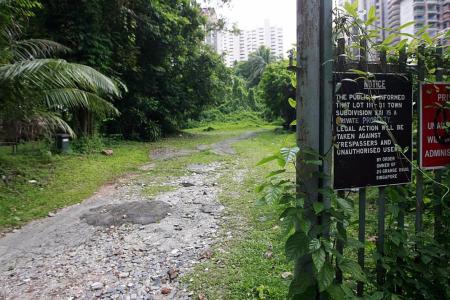End of the road for Grange Road legal tussle
Apex court dismisses developer's appeal for compensation in 40-year tussle over right of way across strip of land
A developer's appeal for compensation after a 40-year tussle with Grange Heights condominium residents over a right of way across a strip of land to Grange Road has been dismissed.
In dismissing Lee Tat Development's appeal, the five-judge Apex court noted that the long-standing battle with the condominium's management corporation (MCST) had raised matters of legal significance.
Judge of Appeal Andrew Phang, in judgment grounds on Aug 17, said: "It is ironic that a dispute bitterly fought over several decades by two parties who have nothing but personal ill will towards each other has engendered (for Singapore law) questions of the first importance in relation to the development of the common law in general and tort law in particular."
The dispute began in 1974 when Lee Tat's predecessor, Collin Development, sought a court declaration that Hong Leong Holdings, the developer of Grange Heights, had no right of way across the 883 sq m strip of land.
In 2005, the Court of Appeal said Grange Heights residents had right of way, but its decision was overruled three years later.
Lee Tat then sued the MCST in the High Court in 2012. It sought damages for the MCST's alleged malicious prosecution of two previous actions to assert the right of way, and for allegedly abusing the court's process by asserting that right in four previous actions.
Lee Tat also took issue with the MCST for alleged malicious falsehoods and for trespassing on Lee Tat's property, by using the strip of land until the Court of Appeal decision in 2008.
Justice Kannan Ramesh dismissed Lee Tat's suit in May last year and urged the parties to close the "protracted and convoluted chapter". Instead Lee Tat filed an appeal, which triggered a rare five-judge panel that heard the case in February.
Lee Tat's lawyers, Senior Counsel Chelva Rajah and Ernest Balasubramaniam argued, among other things, for compensation for the opportunity cost of not being able to develop two relevant plots of land for over a decade because of the MCST's actions.
Senior Counsel Tan Chee Meng and lawyers Jocelyn Ngiam and Chia Shi Jin appeared for MCST, while Singapore Management University professor Gary Chan served as amicus curiae - a friend of the court - appointed to research and present views on issues.
In a 105-page judgment, the Apex court ruled a party is not entitled to recover damages for the malicious prosecution of civil proceedings against him except in limited and defined cases, unlike Lee Tat's case.
The court further rejected the claim for the tort of abuse of process, explaining such a move would "encourage satellite litigation and prolong disputes, particularly among parties who have animosity between them."
It pointed out there are existing civil procedure rules to deal with various aspects of court process abuse.
"If we had, as Lee Tat has urged, recognised the torts of malicious prosecution or abuse of process, but had found against Lee Tat on the relevant facts (as we indeed have done), then Lee Tat would by its own hand have sown the seeds of future proceedings against it by the MCST based on these very same torts.
"Such proceedings could have gone on ad infinitum with the parties taking turns to play plaintiff", given the long and acrimonious relationship between Lee Tat and the MCST.
The decision by the Apex court is final.
Get The New Paper on your phone with the free TNP app. Download from the Apple App Store or Google Play Store now



